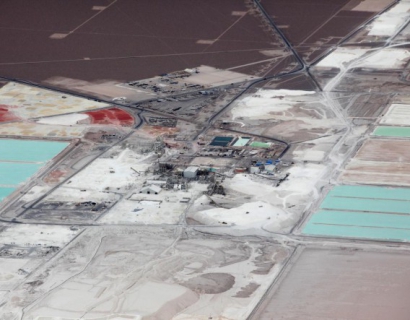Everything for  Business
Business
 Business
Business
 Business
Business
China’s Tianqi Lithium is nearing a deal to buy a 24 percent stake in Chile’s Sociedad Quimica Y Minera SQMa.SN, one of the world’s biggest lithium producers, for about $4.3 billion, two people close to the transaction said.

China’s Tianqi Lithium is nearing a deal to buy a 24 percent stake in Chile’s Sociedad Quimica Y Minera (SQM) SQMa.SN, one of the world’s biggest lithium producers, for about $4.3 billion, two people close to the transaction said.
Chengdu-based Tianqi, which is building the world’s biggest lithium processor in Western Australia, is looking to sign a deal to acquire the stake in SQM from Canadian fertilizer company Nutrien Ltd, the people said.
Nutrien, formed by the merger of Agrium and Potash Corp of Saskatchewan, must sell its stake in SQM by next March as part of a commitment to regulators approving the deal. Nutrien owns about 30 percent of SQM, which also has significant fertilizer production.
The more actively traded B-shares of SQM SQM_pb.SN jumped as much 6.8 percent to a four-month high after the Reuters report. Nutrien shares extended gains, hitting a near two-month high, and were up 2.3 percent at C$66.19.
Based on SQM’s market value of $14.8 billion at Monday’s close, Tianqi would pay a roughly 22 percent premium for the shares in the world’s lowest-cost producer of lithium.
Tianqi’s interest comes as Beijing aggressively promotes electric vehicles - lithium is a key ingredient in rechargeable batteries - to combat air pollution and help domestic carmakers leapfrog the combustion engine to build global brands.
But the SQM stake purchase could hit snags.
Chile’s former government in March asked antitrust regulator FNE to block the stake sale to Chinese firms, saying it would distort the global lithium market and give China an unfair advantage in securing strategic resources. FNE has until August, with the possibility of extensions, to determine whether to launch an investigation.
China’s trade representative to Chile told Reuters last week that Beijing suspects other countries have lobbied Chile to block Chinese firms from purchasing the SQM stake.
Tianqi, which is in talks with several institutional investors and banks for financing, plans to fund the deal through bank loans, mezzanine loans and its own working capital, the people said.
Chinese state-run conglomerate Citic Group and its unit China Citic Bank are considering providing part of the capital for the stake acquisition, they added.
“It is inconvenient to disclose any details because of business secrets,” CITIC Bank said in an emailed statement in response to a Reuters request for comment.
Chinese private equity firm GSR Capital has also been vying for the stake, two separate people familiar with the matter said. It was not clear if GSR was raising the financing for a deal of its own.
SQM, Tianqi, GSR, and Citic Group did not respond to requests for comment. Nutrien declined to comment. All the people declined to be identified as the deal details were private, and they cautioned that there is no certainty that a deal would be reached.
Nutrien said last week it expects to announce the sale of its stake in SQM by the end of the second quarter.
If the deal goes through, Tianqi would likely secure three seats on SQM’s eight-member board, one of the sources said.
SQM currently has annual lithium carbonate production capacity of 48,000 tonnes in Chile, which it will expand to 70,000 tonnes by mid-2018 and to 100,000 tonnes in 2019.
Shenzhen-listed Tianqi, which has a market capitalization of $9.5 billion, plans to raise at least $1 billion from a Hong Kong float this year, IFR reported. Part of the proceeds would be used to finance its investments.
Tianqi makes a variety of raw materials for the battery industry. Its lithium project in Australia produces hard rock lithium, primarily for export to China.
Reuters.com
 What are you doing with your RV in the offseason?
What are you doing with your RV in the offseason?
 Adobe will buy online design startup Figma for $ 20 billion
Adobe will buy online design startup Figma for $ 20 billion
 To combat the gas crisis, Germany offers a new plan for cheap transit
To combat the gas crisis, Germany offers a new plan for cheap transit
 Porsche family seeks iPO buyout after tearful defeat
Porsche family seeks iPO buyout after tearful defeat
 Clubs and bars are popping up all over Manhattan, providing an alternative social hub and jobs.
Clubs and bars are popping up all over Manhattan, providing an alternative social hub and jobs.
This site uses cookies and other visitor identifiers for the convenience of each user. If you stay on our site after reading this message, it means that you have no objection to the use of these technologies. Learn more
